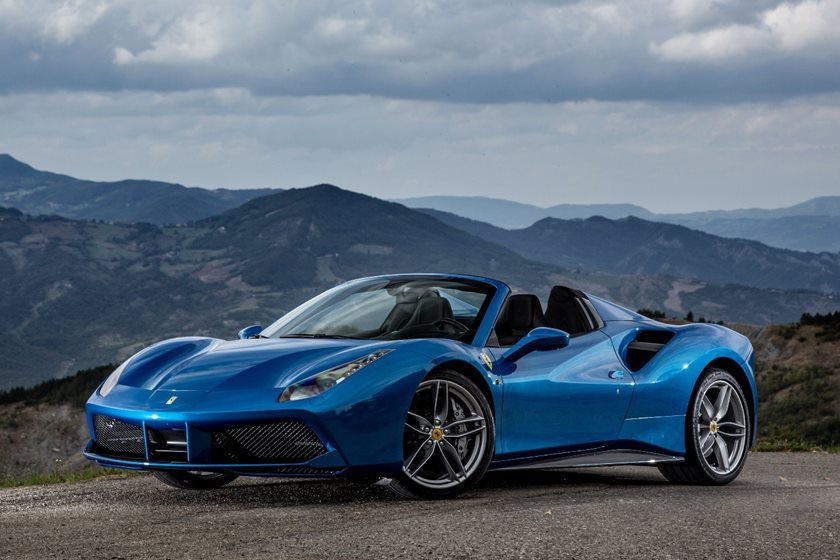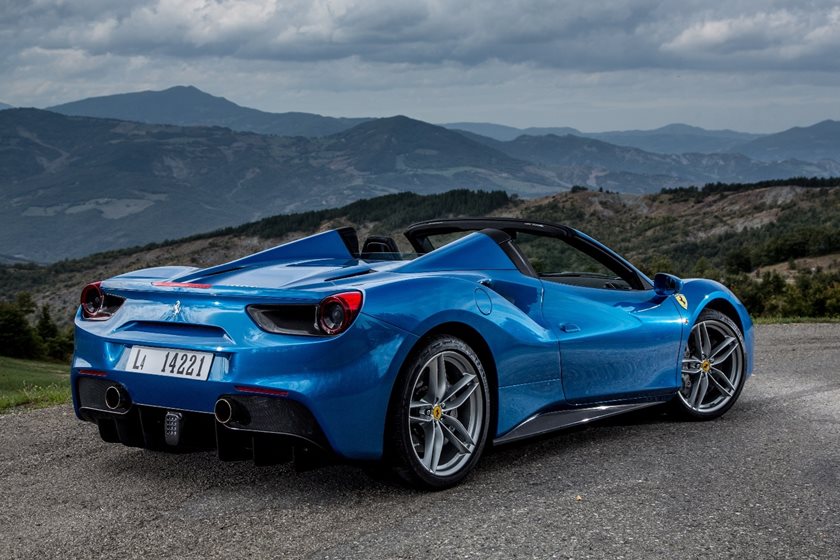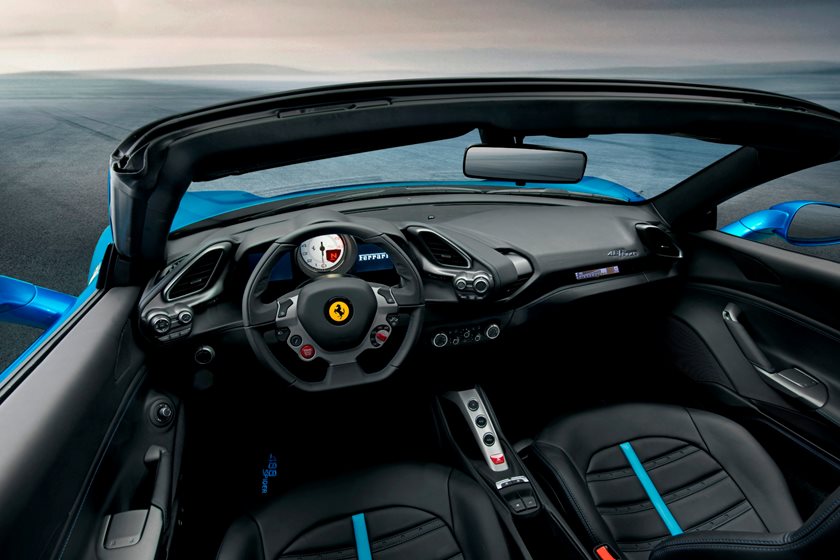The Ferrari 488 Spider is the natural successor to the highly acclaimed 458 Spider, which blew journalists and owners away with its performance, poise, and a general sense of occasion. It was also pretty nice to look at. So when Ferrari announced the replacement for the 458, ears pricked and checkbooks were flipped open; but is the 488 a worthy successor? Powered by an 8th generation V8, in this case, a 3.9-liter twin-turbo unit, the 488 Spider produces a monumental 661 horsepower and 561 lb-ft of torque and will rocket the 488 from 0 to 62 mph in around three seconds flat. It should also impress Dominic Toretto with its quarter-mile time of only 10.55 seconds. The 488 has improved upon the 458's recipe in every conceivable way on paper, but sometimes efficiency and number chasing get in the way of a pure driving experience. Perhaps the 488 Spider has become too exceptional for its own good.
The 488 Spider made its first public appearance at the Frankfurt Motor Show in September 2015 and was the natural successor of the adored 458 Spider. It was Ferrari's 8th model in their V8 series of cars, which started in 1977 with the 308 GTS. The 488 also sees a move away from the traditionally naturally aspirated range of engines, and despite producing around 100 hp more than the 458, some will surely miss the 9,000 rpm howl and crisp responses of the old 4.5-liter motor.
The 2019 model year was the last for the 488 Spider and this year marked the arrival of the 488 Pista Coupe and Spider models. These race-derived cars took over from the normal 488 models for the last two years of 488 production as an ultimate-edition swansong before the arrival of the F8 Tributo as a 2020 model. As such, the run-out 2019 488s were the same as the 2018 models.
While the coupe received a limited-edition Pista Piloti derivative to celebrate Ferrari's driver's and constructor's victories in the FIA World Endurance Championship, the 2018 Ferrari 488 Spider remained unchanged for this model year.
To commemorate 50 years of Ferrari in Japan, a limited edition Ferrari J50 was launched, of which only ten were built. It was an open-top car based on the Spider but restyled to evoke the Ferraris of the '70s and '80s. The normal 488 Spider continued unchanged.
The 2016 model 488 Spider replaced the 2015 458 Spider but was a substantially upgraded 458 and not all-new, evidenced by the familiar exterior and interior. The body provides a lot more downforce and the chassis was tweaked to suit the new engine and aerodynamic properties. The engine is all-new - a twin-turbocharged 3.9-liter V8 engine packing 661 hp and a mammoth 561 lb-ft, the latter figure far higher than the outgoing 458's naturally aspirated 398 lb-ft.
The 488 Spider replaces the already classic 458 Spider as Ferrari's mid-engined convertible supercar of choice. It is available in a single model and trim configuration, but there is a number of optional extras on offer. Power is provided by a twin-turbocharged 3.9-liter V8 engine, which produces 661 hp and 561 lb-ft of torque. The exterior of the 488 Spider features a power roof that folds up and down faster than any other powered drop-top Ferrari in history. Under the skin, you get adaptive suspension, carbon-ceramic brakes, and high-tech underbody aero for increased downforce. The interior features leather bucket seats, climate control, keyless ignition, cruise control as well as Bluetooth streaming and Apple CarPlay integration. Optional extras range from bicolor paint jobs and extra carbon-fiber trim to seat material and style. We would recommend the sports exhaust system and passenger infotainment display.
Replacing the highly praised 458 Spider was never going to be an easy task, but the 488 Spider brings a lot to the table and improves upon a few key areas that were lacking in the 458. The twin-turbocharged V8 engine delivers seamless power throughout the rev range, and the seven-speed DCT transmission is crisp and snappy. Adaptive suspension makes daily driving easier to live with, and modern comforts such as Apple CarPlay integration and Bluetooth streaming are welcome additions to an otherwise sparse interior. Options include a sports exhaust system and passenger infotainment display.
The 488 Spider is not only a thing of beauty but features some proper race-bred tech, which is usually reserved for the track. Specialized underbody aero improves downforce, and interestingly, the 488 Spider's top comes off faster than any other Ferrari V8 model (14 seconds). The design is similar to the 458 it replaces, however, it harks back to berlinettas of old, with the side air intakes reminiscent of the old 308 GTB intakes.
The mid-engine 488 Spider retains the 488 Coupe's dimensions but gains a bit of weight in the process. Total length comes in at 179.8 inches; it sits 76.9 inches wide and 47.7 inches high. The front and rear track measurements are 66.1/64.8 inches respectively. Ferrari provides a dry weight figure of 3362 lbs, which is 110 lbs heavier than the Coupe.
There is a range of colors available, including the obligatory red. Strangely, the 488 Spider was not originally available in Ferrari Red: the first batch of cars was sold in a metallic blue, while the classic colors were only made available later.
For those who think that adding a turbocharger would cause lag, Ferrari claims a throttle reaction time of only 0.8 seconds at 2,000 rpm in third gear; in reality, you'd be hard-pressed to tell the difference between the old motor and this one. The seven-speed dual-clutch transmission is precise and fast and compliments the engine beautifully. Ferrari claims a 0-62 mph time of three seconds flat, and a quarter-mile time of only 10.55 seconds.
The 3.9-liter twin-turbo V8 engine lurking beneath the rear engine cover of the 488 Spider has divided opinions amongst Ferrari fans, with some purists saying that forced induction has detracted from the overall driving experience, while others have lauded the engine for its monstrous torque levels and overall stunning power delivery. Power outputs are impressive: you get 661 hp at a high 8,000 rpm and 561 lb-ft of torque at 6,750 rpm in seventh gear - an important claim, because Ferrari electronically limits the torque in lower gears to simulate the building progression of a naturally aspirated engine.
Losing a roof doesn't mean the 488 Spider has lost the ability to handle, in fact, most drivers will be hard-pressed to find any differences at all, although a slight shudder does transfer through the steering wheel when dealing with undulating road surfaces, and the added weight is hardly noticeable. With standard Side Slip-angle Control, magnetic dampers, and wide sticky tires, the 488 Spider will cling on for dear life through tight corners but has enough power to break the rear tires loose quickly. The 488 shares its spring rates with the 488GTB, and offers a supple ride at low speeds in its most relaxed driving setting, but it simply can't avoid the dreaded scuttle shake experienced by most convertibles. With all that torque on offer, the 488 is the perfect point and shoot roadster.
When you're talking about an exotic Italian supercar with a mid-mounted twin-turbo V8 producing 661 hp and a mid-ten-second quarter-mile time, your first thought surely won't be "I wonder if it gets good gas mileage," but if you have to know; it doesn't really. The Ferrari 488 Spider will manage a thirsty 16/22/18 mpg city/highway/combined, which is one mile per gallon better than what you'd get in a new Cadillac Escalade. In the real world, the Ferrari 488 Spider's power delivery, and the sound of the turbos is way too addictive to ever think about driving economically, and those numbers should see a healthy drop. With a 22.7-gallon fuel tank, the 488 Spider should have a maximum range of 408.6 miles in mixed conditions.
The tight cabin features wraparound satellite pods that are angled towards the driver, and the more compact dashboard with angled air vents underscores this driver-focused space.
Ferrari has always placed a lot of importance on the way the driver and car connect with each other; the closer you can get to feeling one with the car, the better, and they have come damn near close with the two-seat 488 GTB and 488 Spider.
As with most mid-engined supercars, the 488 Spider does away with the traditional trunk system, purely because there's a twin-turbocharged V8 in the way, and instead moves the trunk space to the front of the car. The frunk in the Ferrari 488 Spider sinks down deeper than most of its rivals and offers a useful 8.1 cubic feet of space. That's enough space to accommodate two carry-on suitcases, and Ferrari offers a luggage set specially crafted to maximize the space, for an exorbitant price. The McLaren 720S Spider offers a smaller 5.3 cubic feet of space in the front, but also gets two cubic feet of space under the soft top's tonneau cover.
Ferrari tends to focus on the job at hand, which is to deliver world-class performance and driver engagement, and as such, the features list tends to suffer somewhat. The 488 Spider doesn't offer you the same type of gear you'd find in a Mercedes-AMG drop-top, but there's enough to make it liveable. The exterior features standard carbon-ceramic brakes hidden behind exquisite 20-inch alloy wheels, the fastest fold-down roof Ferrari has ever produced, and heated side mirrors. Inside, you can expect to find a set of leather sports seats. You also get climate control and cruise control, as well as a reverse parking camera with reverse sensors. The 488 Spider also features keyless ignition, which is activated from the flat-bottomed steering wheel. Assistance features such as slip-angle management and carbon-ceramic brakes trim hairy situations.
Ferrari and Lamborghini are both notorious for their user-unfriendly infotainment systems, or complete lack thereof. Unlike most of its peers, the 488 Spider places the infotainment display behind the steering wheel, which completely excludes the passenger from interacting with the car while driving. At least Ferrari has come to its senses, and now offers standard Apple CarPlay integration, as well as navigation and Bluetooth streaming, but there's no sign of Android Auto. The 488's system has received a slight software and menu update over the 458 but still feels clumsy to use. The optional passenger info display adds a small screen in front of the passenger seat, which displays speed, revs, and navigation information.
The 488 Spider has been recalled four times in the last couple of years. In 2018 the Spider was recalled, along with the 488 GTB due to a software issue that would fail to warn the driver when the brake disks are worn. In 2019 the 488 was recalled for an issue with the fuel vapor separator. Ferrari covers the 488 Spider with a three-year/unlimited mile warranty, which includes corrosion, drivetrain and roadside assistance, but most importantly offers new owners seven years of maintenance, which should put minds at ease.
The 488 Spider has not been tested by either the NHTSA or IIHS, as these rating agencies tend to avoid smashing up six-figure Italian supercars, so there are no official results; still, Ferrari has decades of racing experience behind its name which should count for something.
NHTSA safety ratings are not available at this time.
The 488 Spider features standard carbon-ceramic brakes with ABS, advanced traction control with slip angle management, and front and side-impact airbags.
When Ferrari announced that they would be replacing the globally-loved 458 with the 488, there was obviously much speculation over what it would look like, and most importantly, how it would perform, so it came as a mild shock when Ferrari announced that a twin-turbo V8 would power the 488. A major part of the reason why the 458 Spider was such a success was its naturally aspirated V8 engine, which would create heavenly sounds all the way to 9,000 rpm; and with the roof down, it was hard to beat. The 488 is technically better in most categories; it's more refined, stiffer, more aerodynamic, and certainly a whole lot faster. No one can deny the brilliance of the twin-turbo V8 engine, which teleports the occupants rather than transports them, but the addition of forced induction has muffled the standard car, and we miss chasing revs for maximum power. The 488 is better from a technical aspect, but the 458 Spider did a better job of stirring the soul.
You'll have to cough up some serious dough if you want to get behind the wheel of the 488 Spider; Ferrari asks $280,900, which doesn't include a $3,750 destination fee. The 488 Spider slots in at the upper end of the cost scale, but there are competitors that ask significantly more. The McLaren 720S, for example, will set you back a further $34,100 for a total of $315,000. Adding optional extras such as a bicolor paint job, Goldrake racing bucket seats, or carbon-fiber exterior details will quickly push the base price closer to that of the McLaren.
The 488 Spider is a standalone model and is only available in one trim which makes the decision slightly easier, but you'll always have that power-hungry monkey on your back edging you on to go for the more powerful and dramatic 488 Pista Spider which features the most powerful V8 engine ever fitted to a Ferrari, nevermind a convertible. If we had a blank check and a 488 Spider in our crosshairs, we would get one in Rosso Corsa Metallizzato, a special take on the classic Ferrari Red, and combine that with a Nero Black two-tone job which covers the roof and A-pillars in a luscious black. When it comes to wheel choice, we'd have to go with a set of forged matte Grigio Corsa Diamond-cut rims. On the inside, we'd splash everything in carbon-fiber, and get the passenger infotainment display. To get the most out of that twin-turbo V8, we'd fit the optional sports exhaust, which returns a bit of that naturally aspirated growl we so sorely miss.
| Competitor | Horsepower | MPG | Price (MSRP) |
|---|---|---|---|
| Ferrari 488 Spider | 660 hp | 15/22 mpg | $280,900 |
| Ferrari 458 Spider | 570 hp | 13/17 mpg | $263,553 |
| McLaren 720S Spider | 710 hp | 15/22 mpg | $315,000 |
The 458 Spider was the cherry on the cake of the 458 range and combined the stunningly good looks of the Coupe with the wind in your hair and V8 rasp in your eardrum experience of a drop-top. For some, this was the pinnacle of two-door supercar design from Ferrari, and we would tend to agree. The Spider was powered by the same 4.5-liter V8 found in the Coupe and delivered an impressive 562 hp at an insane 9,000 rpm and 398 lb-ft of torque. These figures allowed the 458 Spider to accelerate to 62 mph in the mid-three-second range, and on to a top speed of close to 200 mph. The 458 Spider is less efficient, with a fuel consumption figure of 13/17/15 mpg city/highway/combined. There's a notable difference between the interior of the 458 and 488: if you thought the 488 felt dated, the 458 would take you down memory lane. The 488 is more practical, more comfortable, and faster, but the 458's engine and transmission combo make us care less about all those other things. If you're going to be driving a lot, get the 488; if not, the 458 will make you smile more.
The McLaren 720S has been lauded for its relentless power delivery, excellent handling, and surprising practicality. The 720S is powered by a 4.0-liter twin-turbocharged V8 engine, which produces 710 hp and 568 lb-ft; that's significantly more than what you get in the 488 Spider, and it shows, not only on the street but on the spec sheet. The 720S Spider will accelerate from 0-62 mph in under three seconds and smash past 210 mph with the top-up. If you really want to mess up your fresh perm, the 720S will do 202 mph with the top down. Despite being more powerful, the McLaren will sip the same amount of fuel at 15/22/18 mpg city/highway/combined. Out on the road, the McLaren is more comfortable and is easy to live with on a daily basis, and on-track performance is electrifying, to say the least. The interior of the 720S features a similar layout to the 488, and all controls are focused on the driver, but the McLaren has better features and a vastly superior infotainment system. The McLaren might cost more, but it's a superb all-rounder and punches way above its weight.
The most popular competitors of 2019 Ferrari 488 Spider:





